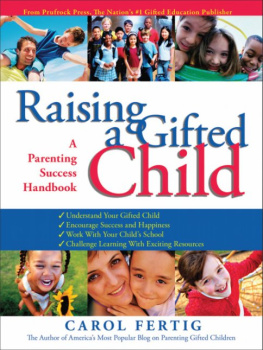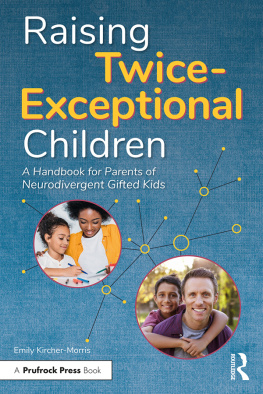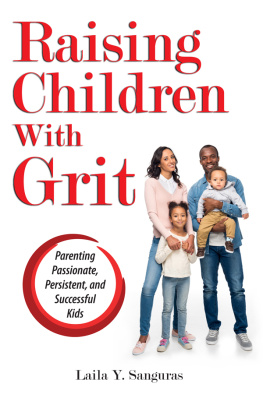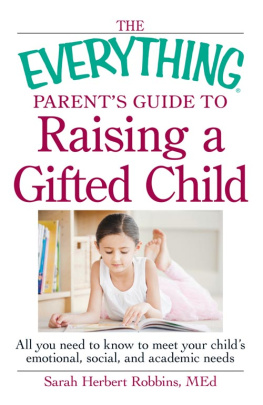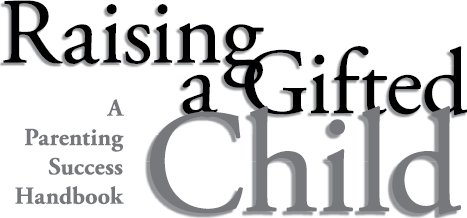
CAROL FERTIG

PRUFROCK PRESS INC.
WACO, TEXAS
Copyright 2009, Prufrock Press Inc.
Edited by Lacy Compton
Cover and Layout Design by Marjorie Parker
ISBN-13: 978-1-59363-507-7
ISBN-10: 1-59363-507-9
No part of this book may be reproduced, translated, stored in a retrieval system, or transmitted, in any form or by any means, electronic, mechanical, photocopying, microfilming, recording, or otherwise, without written permission from the publisher.
Printed in the United States of America.
At the time of this books publication, all facts and figures cited are the most current available. All telephone numbers, addresses, and Web site URLs are accurate and active. All publications, organizations, Web sites, and other resources exist as described in the book, and all have been verified. The author and Prufrock Press Inc. make no warranty or guarantee concerning the information and materials given out by organizations or content found at Web sites, and we are not responsible for any changes that occur after this books publication. If you find an error, please contact Prufrock Press Inc.

Prufrock Press Inc.
P.O. Box 8813
Waco, TX 76714-8813
Phone: (800) 998-2208
Fax: (800) 240-0333
http://www.prufrock.com
To my parents, who always supported my interests,
and
To my two grown sons, whose creativity, resilience,
and passion for life are my inspiration.
INTRODUCTION
R ECENTLY, I was standing in line at the airport when a woman saw my carry-on bag with the words Gifted Education written across the side.
Do you work with gifted children? she asked. I have a daughter who is in fifth grade but reads at a college level. Even though she is an outstanding reader, she doesnt meet the criteria for her schools gifted program. We dont know what to do with her.
I told her about the weekly blog I write at http://www.prufrock.com and suggested she could find lots of ideas there that might help her daughter both in and out of school.
You mean my daughter doesnt need to be in a gifted program for us to get help? she asked.
In the best of worlds, schools would attend to the needs of every child, no matter his or her ability. However, lack of funds, philosophical differences, insufficient teacher training, large class sizes, a wide variety of abilities within the classroom, and a host of other reasons often prevent this from being a reality. But this does not mean that parents should despair.
Families have power. Armed with appropriate knowledge and resources, parents and guardians can better navigate the maze of raising bright kids. Parents dont need to wait for others to make all of the decisions and then be frustrated if things dont work out.
You may advocate for change, but results often can take years. Highly able students need advanced learning and enrichment opportunities now!
The possibilities of providing for gifted kids are not limited to the schoolsthese possibilities extend as far as ones imagination is willing to travel. In addition, no matter how bad or good the opportunities at your childs school, there are many experiences that should still be provided at home.
Parents have the power to educate themselves about gifted issues, learn how to work positively with school systems, and ultimately take responsibility for the education of their sons and daughters. What often is missing is an understanding of how to find and tap into available resources.
There is no one way to define giftedness and no correct prescription for working with highly able individuals. Instead of giving you magic solutions in this book, I have provided a large menu of strategies, organizations, and Web sites to help you help your child learn and develop. You should pick and choose what works best for you and your family in the community in which you reside.
I encourage you to question and discuss philosophies of parenting and educating youngsters. I often pose questions, but do not necessarily provide answers. In the end, you and your family need to decide the answers and solutions that work best in your situation.
I hope you will find this book to be a valuable resource to which you will turn often. I also hope it will provide a basis for discussion in parent networking groups and with educators in the gifted community.
Although parenting is an enormous responsibility, it also is an experience to be cherished. You most certainly will be humbled as you make this journey. You want to help your children learn as they grow, but you also will find that you will grow as you learn from them.
1
WHO IS THIS KID ANYWAY?
WHAT DOES IT MEAN TO BE GIFTED?
T HERE is no universal definition of the term gifted; instead, there are many different opinions. The last Friday of each month the gifted specialists in the school district where I worked met to talk about common issues. On one particular day, our discussion revolved around the meaning of the label gifted. Marsha commented that we (being specialists) all knew what the term meant. Someone in the group questioned that. So, we went around the table and stated just what gifted meant to each of us. Very quickly it became clear that we all had vastly different views.
Some perceived the term to mean high test scores, and some saw it as an unusual way of thinking. Some felt students needed to be considered advanced by several grade levels in all areas, while others considered it important to be advanced in only one subject. Some valued academics, and others valued visual-spatial strength or the arts. Some felt giftedness was determined by a given set of personality or emotional characteristics, while others thought it was exhibited when high grades and compliance came together to make the perfect student. Some felt that one might be gifted for only a short time, while others felt it should last a lifetime. All of the specialists in this group had training in gifted education. Many had at least a masters degree in the field, yet we found that we did not have a common understanding of giftedness. Think of how confusing it must be to those who do not have any background in the field.
After working with classroom teachers and gifted education specialists across the country, I also can tell you that the term gifted often takes on different meanings in different environments. In some very high-level schools where most students work well above the norm for their age, the term gifted may take on a very different connotation than in a school where most students work well below the norm.
Looking beyond school, we see that strengths are valued differently in different societies. For example, in a society where people live off the land, being an excellent hunter or farmer will be valued far more than being able to read.
Even within our own cultural subsets some attributes are valued over others. What about sports or music or art or dance? What about leadership or mediation or oratorical skills? When looking at giftedness in a broad sense, it is not all about academics.
The problem is that the term gifted does not have a precise definition. If you talk to noted experts in the field, you will find many different nuances.
In addition, some people believe a youngster who is gifted will have the curiosity and tenacity to find his own way. Others feel that talent is lost if not appropriately nurturedespecially by the school system.
Next page
